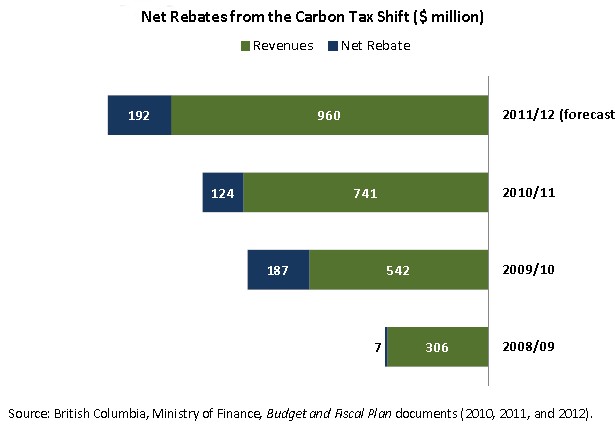British Columbia's carbon tax delivering economic benefits - Report
 British Columbia’s carbon tax shift has lived up to expectations, reducing fuel use in the province by nearly 15%, according to a report released today by Sustainable Prosperity, a green economy think tank.
British Columbia’s carbon tax shift has lived up to expectations, reducing fuel use in the province by nearly 15%, according to a report released today by Sustainable Prosperity, a green economy think tank.B.C. now has the lowest per capita fuel use of any province in Canada, passing Ontario, which was consistently ahead of B.C. for low fuel use before the introduction of the carbon tax, according to the study, titled British Columbia’s Carbon Tax Shift: Its Effects after Four Years.
The report, which examines the impact of the policy as it marks its four year “anniversary” on July 1st, found that between 2008 and 2011, per capita use of petroleum products, such as gasoline and propane, dropped 15.1% in B. C. During the same period, there was a 1.3% increase in fuel use across the rest of the country.
As well as having a positive impact on the environment, concerns that the tax shift might harm the economy are unfounded, according to the new study.
The latest data suggests there has not been any negative impact on GDP since the tax shift was introduced in 2008, which is in line with evidence from other countries that have brought in similar policies. British Columbia’s economic growth per capita has remained relatively constant during the period that the tax has been in place, even in the face of the global financial crisis.
The carbon tax shift has, in fact, benefitted the economy in many ways: Companies, organizations and individuals have been spurred on by the policy to invest in renewable energy and energy efficiency, which has helped to “decouple” the BC economy’s growth from fossil fuel use.
Professor Stewart Elgie, the report’s lead author, said: “British Columbia’s decision to introduce a carbon tax shift in 2008 was a courageous and far-sighted one. Our study shows that the decision was also a wise one, inasmuch as the tax shift has delivered real environmental benefits to the province, even as the BC economy has continued to grow.”
“Moreover, by “decoupling” its economic growth from fuel consumption, the province is making itself less vulnerable to the volatility of fossil fuel prices, and it has created a fiscal advantage for itself through reduced personal and corporate income cuts,” he added.
The report notes that while B.C.’s carbon tax is meant to be revenue neutral, the government has in fact returned $318 million more in income tax cuts than it has collected in carbon tax to date (See Chart). The 2011/12 budget forecast calls for a further net rebate of $192 million.

B.C. Environment Minister Terry Lake stated yesterday that from 2007 to 2010, B.C. has reduced greenhouse gas emissions by 4.5 per cent or 2.9 million tonnes, which is the equivalent to eliminating emissions from all the homes in Metro Vancouver (almost three million).
The Minister made the comments as he tabled a legally required annual report ‘Making Progress on BC’s Climate Action Plan’ and the ‘BC Greenhouse Gas Inventory Report 2010’. (Both available here for download)
“The success we’ve achieved to date is like taking one million cars and their emissions off the road and is a testament to choices being made by British Columbians every day to reduce the amount of fuel they use and to power their businesses with cleaner energy,” said Lake.
Sustainable Prosperity will be conducting further research on the impact of B.C.’s carbon tax shift on specific sectors in order to better understand the impact of the policy on consumer and industry choices when it comes to fuel use.
You can return to the main Market News page, or press the Back button on your browser.

